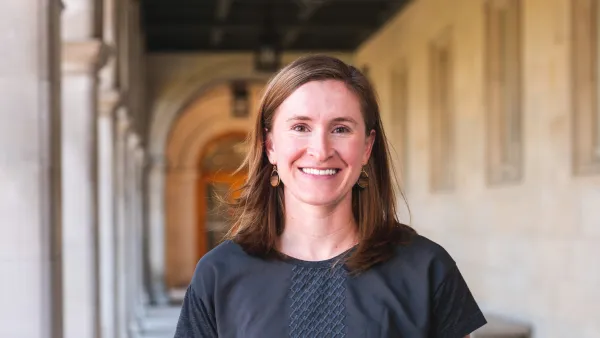Laura Escobar Vega, assistant professor in the Department of Mathematics and Statistics, won a Faculty Early Career Development Program (CAREER) Award from the National Science Foundation for her project “Combinatorial Algebraic Geometry: Flag Varieties, Toric Geometry, and Applications.” The prestigious NSF CAREER program supports junior faculty who model the role of teacher-scholar through outstanding research, excellent education, and the integration of education and research.

“There is a strong record of the study of discrete structures leading to advances not only within mathematics, but also in science and industry,” Escobar said. “At the same time, my project’s educational program is also focused on increasing the participation in mathematics of those traditionally underrepresented and recruiting talented students from underserved communities to PhD programs in math.”
Both components have the potential to benefit society at large.
Escobar’s research project studies and develops discrete structures arising from the interplay between combinatorics and algebraic geometry. On top of her contributions to these fields, she has recently started exploiting the interdisciplinary potential of combinatorics, specifically in machine learning and genetics.
“I’m harnessing the interdisciplinary potential of combinatorics in two ways,” Escobar explained. In one project, she will contribute to recent developments in understanding the complexity of a model from machine learning, working to provide upper bounds – and in some cases exact counts – for numbers indicating the structure of the model. A second project, in collaboration with the Division of Statistical Genomics at WashU’s School of Medicine, will narrow in on human health. “Together with Jason Anema, we’ve developed a very fast graph-theoretic algorithm that is revolutionizing the methods used to identify novel complex genetic structures driving health and longevity outcomes in humans,” Escobar said.
Escobar also anticipates broadening the participation and visibility of underrepresented groups in mathematics by starting a research opportunities program for Washington University’s Joint Post-Baccalaureate Program in Mathematics (JPPM), which is designed to prepare exceptional individuals who already have a bachelor’s degree to make the transition to graduate school, and the Encuentro Colombiano de Combinatoria (ECCO), a biennial summer school in Colombia where actively researched topics in combinatorics are presented by internationally renowned experts.
As Escobar continues to grow her research group, she sees these initiatives as fruitful ways to strengthen bridges between students at WashU and in Latin America and to continue developing the university’s pipeline for women and Latinx mathematicians.
“I am very excited about helping grow and strengthen both JPPM and ECCO, which provide important opportunities to attract talented students to mathematics, particularly from demographic groups where we have mostly failed to find them,” Escobar said. “In ECCO especially, on top of showcasing excellent mathematics, there is a strong emphasis on community-building, focusing on early career mathematicians as well as members of underrepresented groups.”



